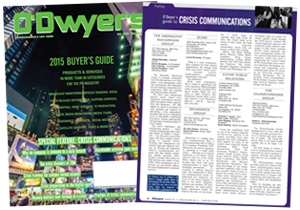 Hurricane Katrina will be remembered for the death and destruction it left behind. But it also changed the way we as an agency think about crisis — or disaster — communications.
Hurricane Katrina will be remembered for the death and destruction it left behind. But it also changed the way we as an agency think about crisis — or disaster — communications.
In crisis communications, we’re asked to think about a worst-case scenario. Katrina taught us that depth of preparation is difficult, because worst cases play out more tragically than anyone can imagine.
While New Orleans will bear the pain of Katrina forever, the storm provided invaluable insight into what happens in a complete disaster.
Here are a few of the most important lessons we learned about crisis planning.
Don’t be surprised when people react completely opposite of what you expected. Tragedies that mounted after Katrina were multiplied under the pain of uncertainty. Were family and friends alive or dead? How long could those left behind survive disease, crime, fires, sweltering heat and buildings without flushing toilets? What would become of family pets and heirlooms? The psychological toll was immeasurable.
|
|
Yet, it wasn’t uncommon to find the strongest personalities found themselves unable to cope. The people you expected to thrive in a crisis were sometimes mentally and emotionally overwhelmed.
Meanwhile, the meek, soft-spoken types were often rocks of stability. It was the quiet wallflowers who frequently rose to the occasion, calmly plodding through the wreckage and figuring out the next course of action.
It didn’t happen with everyone but often enough that you noticed. The juxtaposition was unsettling. When leaders are immobilized, be prepared to accept it without judgment and adapt accordingly.
Technology leaves everyone vulnerable. This has only intensified in the decade since Katrina. Once the power is out for more than a day, laptops and cell phones are useless. Even if you can recharge devices in an outage, Internet connectivity likely will be spotty at best after a disaster.
When was the last time you printed updated hardcopies of critical information? Is it easily accessible any time of day? Do crisis team members have their own hardcopies and key contact information, including backup emails and phone numbers?
Can crisis team members contact each other at a moment’s notice? How will you continue servicing out-of-town clients when your base of operations is destroyed?
Remember that the Gulf Coast watched Katrina coming for several days. Fires, tornados and earthquakes strike with little or no advanced warning.
In a disaster, ordinary becomes priority. You don’t realize how many things are taken for granted until you’re forced to live without them.
When it became obvious that New Orleans would be closed for months, priorities flipped to the most basic needs.
Taking care of yourself and those around you meant finding temporary housing, getting children enrolled in new schools, arranging new transportation and finding access to health care.
Can your employees get salary advances to make it through at least a few days? Does your plan cover paying them if they’re evacuated out of town and cut off, at least temporarily, from bank accounts?
If you have to leave, pack up like you mean it. When you leave the office this Friday, what would you take if you knew you wouldn’t be back for a month? What would you take from home?
In a disaster, you get one chance to evacuate, so take advantage. Fill every inch of space in your car. If the situation gets worse, you may not be home for a while.
As New Orleans’ closure lingered long after Katrina moved on, one of the most common regrets among professionals was not having business clothes that were left behind. Evacuees left New Orleans on a Sunday expecting to be home by Tuesday — not months later.
Prepare to learn a new definition of creative thinking. It wasn’t that options were limited after Katrina — they were often nonexistent. In a worst-case scenario you must be willing to create your own alternatives.
Our own CEO cleverly figured out a way to contact another tenant in our high-rise building who was still operating after the storm. Because of his ingenuity, our agency learned that our offices were intact, and we were able to retrieve a much-needed backup with help from a private security firm.
One local company bought an entire trailer park just outside New Orleans so its employees would have housing.
And be prepared to put aside corporate rivalries for the greater good. Businesses affected by the storm reached out to anyone who could help, even competitors. Every job saved was one more step in the city’s recovery.
Fall in love with a local charity. New Orleans survived Katrina thanks in large part to the charity of nonprofits, volunteer groups and individuals that provided for families who lost everything. Mental-health counseling services made a huge difference in many victims’ ability to cope.
The city was generous before, but the outpouring of support after the storm redefined corporate culture. We came to understand the role of charities in a new light.
Philanthropy is one of the most cost effective ways to prepare for disaster because it helps ensure that nonprofits in your community have the ability to respond when called upon.
* * *
Ann Edelman is Director of Public Relations for Zehnder Communications, a full-service agency in New Orleans, Baton Rouge, and Nashville.



 There’s a fine line between newsjacking and taking advantage, aka ambulance chasing. Our job as PR professionals is to tread it carefully.
There’s a fine line between newsjacking and taking advantage, aka ambulance chasing. Our job as PR professionals is to tread it carefully. PR firms need to be mindful of ways their work product may be protected by the attorney-client privilege whenever working with a client’s internal legal team or its external legal counsel.
PR firms need to be mindful of ways their work product may be protected by the attorney-client privilege whenever working with a client’s internal legal team or its external legal counsel. Manuel Rocha, former US ambassador and intenational business advisor to LLYC, plans to plead guilty to charges that he was a secret agent for Cuba.
Manuel Rocha, former US ambassador and intenational business advisor to LLYC, plans to plead guilty to charges that he was a secret agent for Cuba. CEO mentoring is an often-overlooked aspect of why CEOs are able to make good decisions, and sometimes make bad ones—all of which intersects with the role and duties of a board.
CEO mentoring is an often-overlooked aspect of why CEOs are able to make good decisions, and sometimes make bad ones—all of which intersects with the role and duties of a board.  How organizations can anticipate, prepare and respond to crises in an increasingly complex world where a convergent landscape of global challenges, threats and risks seem to arrive at an unrelenting pace.
How organizations can anticipate, prepare and respond to crises in an increasingly complex world where a convergent landscape of global challenges, threats and risks seem to arrive at an unrelenting pace.


 Have a comment? Send it to
Have a comment? Send it to 
No comments have been submitted for this story yet.